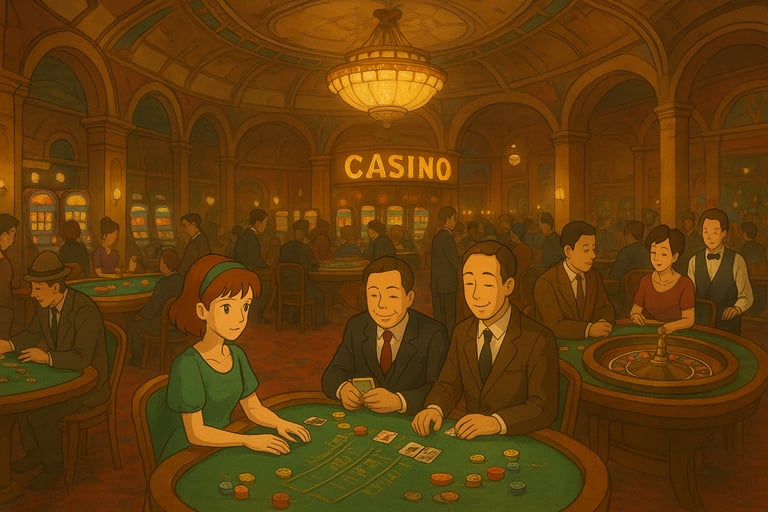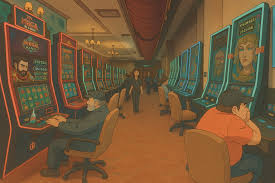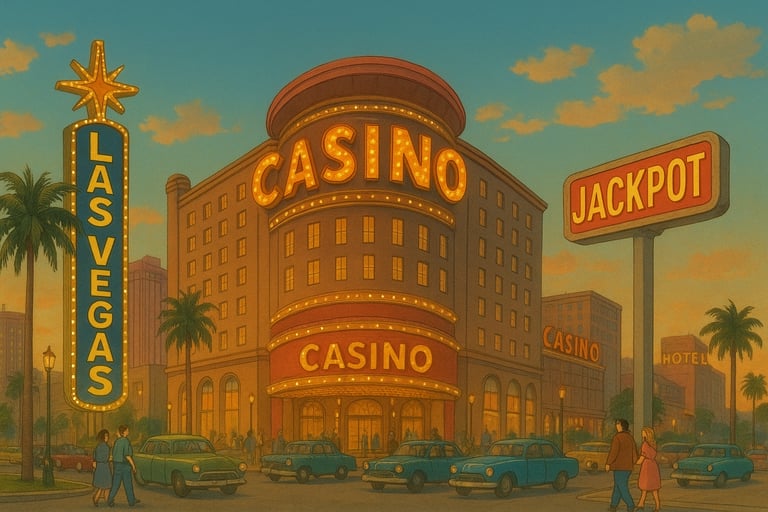Can Gambling Be a Career? | Insights from Gambling Hood
Explore whether gambling can be turned into a career. Learn about skills, risks, strategies, myths, and the reality of earning a living from gambling with Gambling Hood’s expert insights.
CASINO GAMESCASINO TIPSAWARENESS
9/10/20255 min read
Can Gambling Be a Career? A Complete Guide
For many, gambling is a form of entertainment—a thrilling escape from daily life where a spin of the roulette wheel or a well-placed poker bet can bring excitement and the chance of winning money. But for others, gambling isn’t just a pastime; it’s a serious pursuit, almost like a full-time job. This brings us to the big question: Can gambling really be a career?
The short answer is: yes, but with a lot of caution, preparation, and strategy. Unlike traditional jobs where you have predictable income, gambling as a career is filled with uncertainty, high risks, and intense competition. This blog explores what it takes to make gambling a career, the skills required, the psychological and financial challenges, and why most people should approach it carefully.
At Gambling Hood, we aim to educate readers about gambling culture, industry trends, and responsible play. This article isn’t here to romanticize gambling but to provide you with a realistic and informed perspective.
Understanding Gambling as a Career
When we talk about gambling as a career, we’re not referring to someone who occasionally buys a lottery ticket or bets on a sports match for fun. A gambling career means committing to gambling as your primary source of income. People who take this path are typically skilled professionals specializing in games of skill, like:
Poker players who compete in tournaments and cash games
Sports bettors who analyze statistics, trends, and odds to gain an edge
Professional blackjack players who use card counting techniques
Advantage players who exploit promotions, bonuses, or game inefficiencies
For these individuals, gambling is approached the same way someone would approach stock trading, freelancing, or entrepreneurship. It requires discipline, research, and risk management.
The Skills You Need to Be a Professional Gambler
Contrary to popular belief, professional gambling isn’t about being “lucky.” It’s about skill, strategy, and psychology. Here are the core skills required:
1. Mathematical and Analytical Thinking
Professional gamblers are like statisticians. They rely heavily on numbers, odds, and probabilities. Whether you’re counting cards in blackjack or analyzing player stats for sports betting, a strong understanding of mathematics is essential.
2. Bankroll Management
One of the biggest reasons most gamblers fail is poor bankroll management. A professional gambler sets strict limits on how much they’re willing to bet and has a long-term plan for handling wins and losses.
3. Emotional Discipline
Emotional control is critical. Gambling can bring intense highs and lows, and a professional must avoid making impulsive bets after a win or chasing losses after a bad day.
4. Game Expertise
You must specialize in a game or betting niche. Whether it’s poker, blackjack, or sports betting, becoming an expert gives you a competitive edge over casual players.
5. Research Skills
Success in gambling often depends on studying trends, patterns, and strategies. Professional gamblers spend more time researching than actually playing.
The Pros of Gambling as a Career
If done carefully, there are benefits to choosing gambling as a career:
Freedom and Flexibility: You’re your own boss. You set your schedule, choose your games, and work from anywhere in the world.
High Earning Potential: Skilled gamblers can make a lot of money, especially in high-stakes poker tournaments or through strategic sports betting.
Constant Challenge: Gambling is intellectually stimulating. It’s a career where you’re always learning, improving, and testing your skills.
Passion-Driven: If you love the thrill of games, gambling can feel like more than a job—it’s a lifestyle.
The Cons and Challenges
However, it’s crucial to understand that the path is extremely difficult. Most gamblers lose money over time, and even professionals experience months of losses. Here are the major downsides:
Financial Instability: Unlike a steady paycheck, your income will fluctuate heavily. One month might bring big winnings, while the next could wipe out your bankroll.
Psychological Stress: Constant pressure, unpredictability, and emotional swings can take a toll on your mental health.
Isolation: Professional gambling can be a lonely career, especially if you spend hours playing online or traveling to tournaments.
No Benefits or Security: There’s no retirement plan, health insurance, or paid leave when you gamble for a living.
High Risk of Addiction: Being around gambling all the time increases the risk of problem gambling.
Professional Gamblers Who Made It
There are a few success stories in the gambling world, like famous poker players Daniel Negreanu and Phil Ivey, or sports bettors who’ve made millions analyzing odds. These people prove that gambling can be a career.
However, it’s essential to note that for every success story, there are thousands who failed. These professionals spent years mastering their craft, and even they experience losses.
The Different Paths to a Gambling Career
If you’re serious about gambling professionally, here are some common paths:
1. Poker Professional
Poker is one of the most common ways to make gambling a career because it’s a game of skill, not just chance. Online poker and tournaments offer consistent opportunities for skilled players.
2. Sports Betting Expert
Sports betting can be profitable if you’re skilled in analyzing data, player performance, and trends. Many successful bettors treat it like financial trading.
3. Blackjack and Card Counting
Card counting isn’t illegal, but casinos don’t like it. Skilled blackjack players can earn money by gaining a mathematical edge.
4. Advantage Play
Advantage players look for opportunities like bonuses, promotions, or mispriced odds to get an edge over casinos and betting platforms.
Building a Professional Gambling Mindset
If you’re considering gambling as a career, you must treat it like a business:
Create a Business Plan: Set earning goals, track performance, and adjust strategies.
Track Every Bet: Keep detailed records of every wager, win, and loss.
Invest in Education: Study gambling strategies, watch videos, read books, and analyze expert insights.
Surround Yourself with Professionals: Join gambling communities to learn from others’ experiences.
Why Gambling Hood Encourages Caution
At Gambling Hood, our mission is to provide awareness about gambling and its risks. While gambling can be a career for a few, it is not a guaranteed path to wealth.
We encourage readers to:
Start small and never gamble with money you can’t afford to lose.
Learn the difference between gambling for fun and gambling for income.
Take regular breaks and prioritize mental health.
Gambling Hood is a platform dedicated to creating content that educates, informs, and helps readers make responsible choices.
Steps to Get Started Safely
If you’re still curious about gambling as a career, here’s a safe way to explore:
Practice for Free: Many online casinos and poker platforms allow you to play for free. Use this time to hone your skills.
Set a Strict Budget: Treat your gambling money as an investment—never dip into savings or essential funds.
Start Part-Time: Don’t quit your job yet. Build skills and a track record first.
Seek Mentorship: Learn from experienced players who have a history of success.
Use Technology: Betting tools, analytics software, and bankroll trackers can help you make informed decisions.
Gambling vs. Traditional Careers
When compared to traditional careers, gambling is far less stable. Traditional jobs offer salaries, benefits, and predictable growth. Gambling, however, is volatile and requires constant performance.
Think of gambling more like entrepreneurship—it comes with freedom but also uncertainty. If you’re not comfortable with high risk, it’s not the right path.
The Mental Health Side of Gambling Careers
Being a professional gambler means dealing with constant pressure, long hours, and unpredictability. It’s important to:
Take regular breaks
Maintain hobbies outside of gambling
Seek counseling or therapy if gambling affects your mental health
Practice mindfulness or meditation to stay calm during swings
The Future of Gambling Careers
With online gambling, esports betting, and cryptocurrency-based casinos growing rapidly, there are more opportunities than ever for skilled gamblers. Technology also makes it easier to analyze data and track your performance.
However, increased competition means that gambling as a career will always be challenging. The house always has an edge, and only a small percentage of people will succeed.
Conclusion
So, can gambling be a career? Yes, but only for a select group of highly disciplined, skilled individuals who treat it like a business. For most, gambling should remain a form of entertainment.
If you’re interested in exploring gambling responsibly, platforms like Gambling Hood offer valuable resources, guides, and insights to help you stay informed. Remember: the goal is to enjoy the thrill of the game while staying safe and financially secure.










© 2026 All rights reserved.
Follow us
Quick Links


